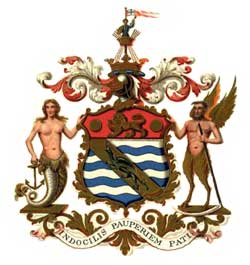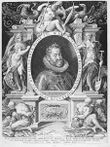Many thanks to our Patrons who cover ~2/3 of our hosting bill. Please join them if you can.
1552
Jump to navigation
Jump to search
1542 < 1543 < 1544 < 1545 < 1546 < 1547 < 1548 <1549 < 1550 < 1551 < 1552 > 1553 > 1554 > 1555 > 1556 > 1557 > 1558 > 1559 > 1560 > 1561 > 1562
| Year 1552 |
Year 1552 (MDLII) was a leap year starting on Friday of the Julian calendar.
Contents
Events
January–June
- January 15 – Henry II of France and Maurice, Elector of Saxony, sign the Treaty of Chambord.
- February 12 – Pedro de Valdivia founds the Chilean city of Valdivia, as Santa María la Blanca de Valdivia.
- February 24 – The privileges of the Hanseatic League are abolished in England.
- March – The Act of Uniformity imposes the Protestant Book of Common Prayer on England.
- March 26 – Guru Amar Das becomes the Third Sikh Guru.
- April – War breaks out between Henry II of France and Emperor Charles V. Henry invades the Duchy of Lorraine, and captures Toul, Metz and Verdun.
- April 11 – Metz Cathedral is consecrated.
- April 16 – Pedro de Valdivia founds the city of La Imperial, Chile.
- May – Maurice, Elector of Saxony, captures Augsburg, and almost seizes Charles V, Holy Roman Emperor at Innsbruck, leading to the suspension of the Council of Trent.
July–December
- July 6–July 9 – In Hungary, Drégely Castle is attacked by the Ottoman Empire. Captain György Szondy and c. 140 soldiers in the castle die, after 4 days of fighting against 8,000 Turkish raiders.
- August 2
- John Frederick, Elector of Saxony and Philipp I of Hesse, taken prisoner by Charles V in 1546, are released.
- The Peace of Passau revokes the Augsburg Interim of 1548, and promises religious freedom to the Protestant princes.
- September – In Hungary, captain István Dobó commands the breaking of the Siege of Eger, led by Kara Ahmed Pasha of the Ottoman Empire.
- September 24 – The Debatable Lands on the border of England and Scotland are divided between the two kingdoms by a commission creating the Scots' Dike in an unsuccessful attempt to halt lawlessness here, but giving both countries their modern borders.
- October 2 – The Khanate of Kazan falls to troops of Ivan IV of Russia.
Date unknown
- In the Persian Gulf, the Ottoman Empire Red Sea Fleet attacks the Portuguese stronghold of Hormuz, but fails to capture it.[1]
- The Ottoman's capture the city of Temesvar.
- In Italy, Bartolomeo Eustachi completes his Tabulae anatomicae, presenting his discoveries on the structure of the inner ear and heart,[2] although, for fear of the Inquisition, it will not be published until 1714.
- King Edward VI of England founds 35 grammar schools by royal charter,[3] including Shrewsbury; Leeds Grammar School is also established.
Births
- January 14 – Alberico Gentili, Italian jurist (d. 1608)
- January 22 – Walter Raleigh, English explorer (d. 1618)
- February 1 – Edward Coke, English colonial entrepreneur and jurist (d. 1634)
- February 8 – Agrippa d'Aubigné, French poet and soldier (d. 1630)
- February 19 – Melchior Klesl, Austrian statesman and cardinal (d. 1630)
- February 20 – Sengoku Hidehisa, Japanese daimyō (d. 1614)
- February 25 – Magdalene of Lippe, Countess of Lippe by birth, and by marriage Landgravine of Hesse-Darmstadt (d. 1587)
- February 28 – Joost Bürgi, Swiss clockmaker and mathematician (d. 1632)
- March 1 – Anna of Cleves, Duchess of Jülich-Cleves-Berg by birth and by marriage Countess Palatine of Neuburg (d. 1632)
- March 18 – Polykarp Leyser the Elder, German theologian (d. 1610)
- March 20 – Christoph, Count of Hohenzollern-Haigerloch (d. 1592)
- April 20 – Frederick IV of Liegnitz, German noble (d. 1596)
- May 8 – Petrus Ryff, Swiss scientist (d. 1629)
- May 12 – Edmund Bowyer, English politician (d. 1627)
- June 2 – Raja Wodeyar I, King of Mysore (d. 1617)
- June 8 – Gabriello Chiabrera, Italian poet (d. 1638)
- June 17 – John George of Ohlau, Duke of Oława and Wołów (1586-1592) (d. 1592)
- June 29 – Elizabeth Spencer, Baroness Hunsdon, English baroness (d. 1618)
- July 18 – Rudolf II, Holy Roman Emperor (d. 1612)[4]
- July 22
- Anthony Browne, Sheriff of Surrey and Kent (d. 1592)
- Mary Wriothesley, Countess of Southampton, Lady of English peer and others (d. 1607)
- August 14 – Paolo Sarpi, Italian writer (d. 1623)
- August 21 – Muhammad Qadiri, Founder of the Naushahia branch of the Qadri order (d. 1654)
- August 24 – Lavinia Fontana, Italian painter (d. 1614)
- September 12 – André Schott, Brabantian Jesuit priest, academic, linguist, translator, editor (d. 1629)
- September 20 – Lorenz Scholz von Rosenau, German botanist (d. 1599)
- September 21 – Barbara Longhi, Italian painter (d. 1638)
- September 22 – Tsar Vasili IV of Russia (d. 1612)
- September 27 – Flaminio Scala, Italian playwright and stage actor (d. 1624)
- October 6 – Matteo Ricci, Italian Jesuit missionary to China (d. 1610)
- October 11 – Tsarevich Dmitry Ivanovich of Russia, Grand Prince of Moscow (d. 1553)
- October 18
- Elisabeth of Saxony, Countess Palatine of Simmern (d. 1590)
- Francis Cherry, English diplomat (d. 1605)
- October 23 – Odet de Turnèbe, French dramatist (d. 1581)
- October 28 – Simón de Rojas, Spanish saint (d. 1624)
- December 18 – Ahmad Ibn al-Qadi, Moroccan writer, judge and mathematician (d. 1616)
- November 20 – Gilbert Talbot, 7th Earl of Shrewsbury, English politician and Earl (d. 1616)
- November 26 – Seonjo of Joseon, King of Joseon (d. 1608)
- December 27 – William Cavendish, 1st Earl of Devonshire, English politician and Earl (d. 1626)
- December 29 – Henri I de Bourbon, prince de Condé (d. 1588)
- December 31 – Simon Forman, English occultist and astrologer (d. 1611)
- date unknown
- Hans von Aachen, German mannerist painter (d. 1615)
- Thomas Aufield, English Catholic martyr (d. 1585)
- Jean Bertaut, French poet (d. 1611)
- Philemon Holland, English translator (d. 1637)
- Prince Masahito, Japanese prince (d. 1586)
- Lady Saigō, Japanese concubine (d. 1589)
- Dom Justo Takayama, Japanese daimyo (d. 1615)
- Jean Hotman, Marquis de Villers-St-Paul, French diplomat (d. 1636)
- Cvijeta Zuzorić, Croatian poet (d. 1648)
- probable
- Miguel de Benavides, Spanish clergyman and sinologist (d. 1605)
- Francisco Goméz de Sandoval y Rojas, Duke of Lerma, Spanish politician (d. 1625)
Deaths
- January 3 – Henry of the Palatinate, bishop of Utrecht (b. 1487)
- January 10 – Johann Cochlaeus, German humanist and controversialist (b. 1479)
- January 22 – Edward Seymour, 1st Duke of Somerset, English politician (b. 1509)
- February 6 – Henry V, Duke of Mecklenburg (b. 1479)
- February 20 – Anne Parr, Countess of Pembroke, English countess (b. 1515)
- February 26 – Heinrich Faber, German composer (b. 1500)
- March 29 – Guru Angad, Indian religious leader (b. 1504)
- April 19 – Olaus Petri, Swedish clergyman (b. 1493)
- April 18 – John Leland, English historian (b. 1502)
- April 21 – Petrus Apianus, German astronomer (b. 1495)
- May 26 – Sebastian Münster, German cartographer and cosmographer (b. 1488)
- June 10 – Alexander Barclay, British poet (b. 1476)
- July 9 – György Szondy, Hungarian soldier
- August 15 – Hermann of Wied, German Catholic archbishop (b. 1477)
- September 23 – Barbara of Brandenburg-Ansbach-Kulmbach, Landgravine of Leuchtenberg (b. 1495)
- October 14 – Oswald Myconius, Swiss Protestant reformer (b. 1488)
- October 17 – Andreas Osiander, German Protestant theologian (b. 1498)
- November 10 – Günther XL, Count of Schwarzburg (b. 1499)
- December 3 – Francis Xavier, Spanish Jesuit missionary and saint (b. 1506)
- December 20 – Katharina von Bora, wife of Martin Luther (b. 1499)
New Groups
| Group | Image | Type | Description |
|---|---|---|---|
| Merchant Venturers |  | Secret society | A royally chartered group of 85 rich individuals, centered on Bristol, exercising great influence over financial institutions, big media and big oil. |
| Christ's Hospital |  | School Independent | British public boarding school |
Many thanks to our Patrons who cover ~2/3 of our hosting bill. Please join them if you can.
References
- ↑ Fierro, Maribel, ed. (2010). "Chronology". The New Cambridge History of Islam, Volume 2: The Western Islamic World, Eleventh to Eighteenth Centuries. Cambridge: Cambridge University Press. p. xxxiii. ISBN 978-0-521-83957-0. "Failed Ottoman attempt to conquer Hormuz."
- ↑ Grun, Bernard (1991). the Timetables of History (3rd ed.). New York: Simon & Schuster. p. 245
- ↑ Williams, Hywel (2005). Cassell's Chronology of World History. London: Weidenfeld & Nicolson. pp. 218–223
- ↑ https://www.britannica.com/biography/Rudolf-II-Holy-Roman-emperor


